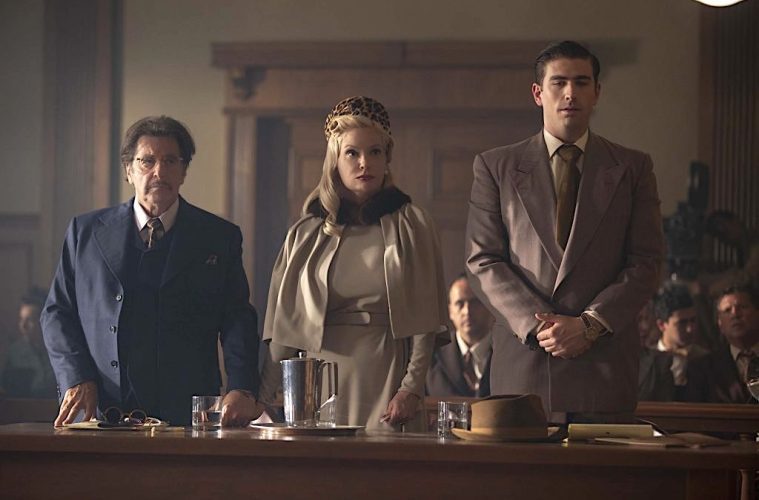Treason is an ugly thing — it sullies both the traitor and those betrayed. Turncoats must lie, of necessity, spreading misinformation, fanning grievances and hatred, and disguising their true intentions in order to turn citizens against one another. Of course, this man’s traitor might be that woman’s patriot, because when words are weapons, who can say which exact phrase will cause a particular person to abuse, attack, imprison, or exterminate another human being.
American Traitor: The Trial of Axis Sally wrestles with this conundrum by revisiting the real-life case of Mildred Gillars, a wannabe Broadway star who settled for the role of dulcet-toned Nazi propagandist and ended up being tried for treason against the United States.
The film zigzags through the years: here is bottle blond Gillars (Meadow Williams) broadcasting from a well-appointed studio in Berlin, warning Americans to stay out of Europe’s conflict because the U.S. owed nothing to Britain. Fast forward to Germany in ruins after World War II, when soldiers from the American occupation force arrest Gillars. Known by such nicknames as Axis Sally, Midge, and the Bitch of Berlin, Gillars was popular with soldiers at the front, who enjoyed her none-too-subtle come-ons; her most popular nom de broadcast came from a description of herself as “the Irish type — a real Sally — with a figure, black hair, white skin. I think I’m just an armful.” Powerful transmitters relayed her voice to the home front as well, where her reports on wounded American soldiers relieved families who had feared the worst when a husband, son, or brother went missing.
Sally’s meandering singing voice dovetailed with the flatlined German jazz that provided musical breaks between her monologues ridiculing the leader of the country she was born in: “This is Berlin calling. Berlin calling the American mothers and wives. It’s a disgrace to the American public that they don’t wake up to the fact of what Franklin Roosevelt is doing to the gentiles of your country and my country.” She read dialogue that was always written by others, sometimes by the minister of propaganda himself, Joseph Goebbels. When Sally goes off script and substitutes “unbeatable” for “invincible” to describe the German army and how it will slaughter any invaders, the Nazi overlord rapes her for overstepping, while musicians and her own boyfriend avert their eyes from the crime unfolding behind the recording booth’s glass.
In the American trial, Sally was represented by the flamboyant James J. Laughlin, a lawyer known for antagonizing prosecutors and judges alike. Al Pacino is no stranger to courtroom dramas (And Justice for All, The Devil’s Advocate), but here, disheveled and hunched, he tells his assistant, “I cannot stand that damn Gillars broad. Did you see the way she walked in, like she was Betty Davis or something? I don’t want anything to do with her for the rest of the trial.” Laughlin, we learn later, has lost a son in the war, but that does not stop him from ultimately defending his unsympathetic client. His aversion to the then 48-year-old Gillars was shared by many Americans. Reporting on the trial, in early 1949, Richard Rovere had this to say in his “Letter From Washington” column for The New Yorker: “In all this weird collection of war surplus, the weirdest item by far, and most incongruous, is Miss Gillars herself.” He goes on to describe her “Miami Beach tan, the cosmetic nature of which is given away by the prison pallor of her hands.”
As Gillars, Meadows conveys a woman who lunged for the brass ring of stardom but found herself spouting the nasty dross written for her by the likes of Goebbels, a writer rejected by publishers until the Nazi party’s own presses printed his novel, Michael, which sold well as his star in the regime rose. Likewise an artistic mediocrity, Sally found herself in a land where innovation, imagination, or any form of veering from the official dictates was dangerous. When the bullies and thugs rule, art serves only their purposes and only at their pleasure.

Job interview with Goebbels (Vertical Entertainment)
In an article written in 1943, for Harper’s magazine, when Sally and others such as Tokyo Rose and Lord Haw-Haw were world-famous, future chronicler of the Third Reich William L. Shirer wrote, “Between the two wars, Fascism and Nazism attracted human derelicts as a flame attracts a moth. Most of the Nazi hierarchy consisted of derelicts from the First War, who could not find a place in the Germany of the [Weimar] Republic. Nazism offered them, as it offered our American traitors, a chance to become somebody. It offered them a career and it offered them something ready-made on which to vent their hates.”
With expository montages of headlines and a palette weighted to grays and browns, American Traitor feels like it might have been made in the historical moment it is portraying. Michael Polish’s workmanlike direction keeps the focus on the words; in his summation for the defense, Pacino, like Spencer Tracy, Gregory Peck, and Orson Welles before him, demands that laws, not passions, prevail: “Who is really responsible for those words? It was the ugly propaganda machine of the Third Reich — Goebbels and Hitler’s words, not Miss Mildred Gillars’.… I have to say it. This feels like vengeance. We must not sacrifice this woman at the holy altar of patriotism, a patriotism, which very easily could be covering up a lynch mob! Then the tyranny, which we fought against for years, will become us.”
Gillars was born in Portland, Maine, in 1900, the dawn of the 20th century. An abusive childhood sharpened her desire to escape, and theater was one way out. But in New York, rather than Broadway stardom she found a professor at Hunter College, a German national who embraced both Gillars and Nazism and would eventually return to his homeland. Gillars followed him, and returned to America only to stand trial for her life.
World War II left enduring scars and many loose ends — even for the winners. A search of the New York Times morgue from March 11, 1949, reports on the conclusion of Gillars’ trial as well as the history of executions for treason in the U.S., and notes one notorious Nazi sympathizer who beat the rap: “Ezra Pound, adjudged insane, got a prize the other day for his poetry.”
Advertising disclosure: We may receive compensation for some of the links in our stories. Thank you for supporting Irvine Weekly and our advertisers.

